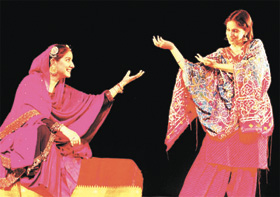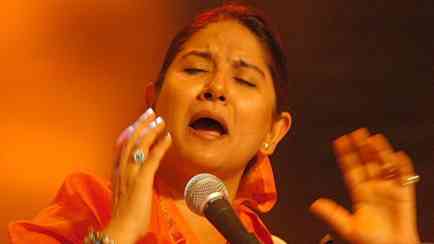By Anjali Singh Jaiswal - Times of India - New Delhi, India
Thursday, March 1, 2007

In an age when the Indian youth lapped up anything related to rock & pop, Rabbi Shergil's sufi numbers had them flocking back to their roots.
He can mesmerise you with his voice and yet seem nonchalant about the effect his music has. But that is Rabbi Shergil for you, an introvert (by his own admission), who can still touch your soul.
Having reached the heights he has, this is one singer turned music director who has managed to remain level-headed despite the heady feel of success. In town recently to promote the album of the flick he has composed music for, he talks to us on being Rabbi, spirituality and then some more.
Bulla Ki Jaana struck a chord with millions, specially the youth, what prompted you to compose it at a time when rock & pop were favoured?There was no specific reason for composing Bulla Ki Jaana... the emotions inside me just found an expression. What effect it would have or had on the world at large was the least of my concerns. I was not doing anything exceptional nor was I taking a risk in a genre of pop or rock. It was the innermost urge to express myself. If I hadn't done so, I have no idea what else I'd have done.
So, you are into spirituality big time then?
In India even if we try to keep away from spirituality, we cannot. We grow up in an atmosphere where early in the morning every home has strains of devotional songs playing. I had my exposure to all things spiritual too, but that does not mean I listened to anything else. My sister and I would watch video re-runs of the Grammy winners. We had every new music releases of U2 and Madonna - our favourites singers. I used to go mad ghisoing these tapes on our mom's old tape recorder.
When did you realise that you wanted to be a singer?
Oh, for sure after I attended a Bruce Springsteen concert in 1989 in New Delhi. That's when I knew I wanted to be a pop star (laughs). But I could not tell my family that as it would have created a furore and I wasn't suicidal. These were things you did not talk about but just went about doing them.
So you wanted a career as a singer and a musician in Bollywood?
Hey, career is a stinky word, I would not want to limit what I want to achieve by calling it a carrr...eer (drags the word for emphasis). I would like to take it as it comes, do something and think nothing of it.
Is that a Khalsa College rebel talking?
No, I don't think it's right not to give the college it's due. I agree there were a handful of guys who earned the college a notorious rep. But the majority of us were into a lot of creative things. We had our own film club called Celluloid through which my friend Saurabh Shukla and I indulged in a lot of activities. We had fantastic teachers like BS Ratna and many more who guided us when we needed help. So coming from Khalsa had its merits as well.
Do you think sufiyana music has become commercialised today?Sufi music in spirit is what I would describe as deeper than a monsoon puddle. Sufi music constantly grows and evolves. In fact, if we go to back to the days of Sheikh Farid and Amir Khusro, it'll be evident how much sufiyana kalams have evolved. Puritans will always have something to say as they feel that traditions are not meant to change when it's the other way round. Music reflects the changing values in society, so there will always be something new to say and sing about in every age.
... there was news of you recomposing Sare Jahan Se Achcha?
Yes, it sure was an experience. I was made to stand on top of a glacier, knee deep in snow, in a thin kurta and asked to sing for my motherland. I was frozen stiff but I did manage to emote for her. How well I did that... we'll have to wait and see as the song is yet to be released.
ISHQ KI NAYEE BAHAAR - ZILA KHAN
Year: 2005
Label: MUSIC TODAY
| Ishq Ki Navee Bahar | |
| Lat Uljhi | |
| Taana Na Maro | |
| Sach Kaho | |
| Ab Kaise Gauna | |
| Ishq Ki Navee Bahar - 2 | |
| Nazuk Hai Nadaan | |
| Rubai (Sufi Darvesh) |
Ishq Ki Navee Bahar - Zila Khan ( mp3)
http://www.savefile.com/files/570417
 Sufi singer Zila Khan with another artist during a rehearsal of the play 'Gods, Graves and Grandmother', inspired by a novel by Namita Gokhale, which will begin on August 9 in the Capital. — Tribune photo |
The script has been adapted by Nicholas Kharkongor and Shena Gamat and is directed by Sanjoy Roy. Starring Zila Khan, the play has been produced jointly by Surina Narula and Teamwork.
| If Teamwork's play "God's Graves and Grandmother" was outstanding, Acme Theatre's short plays "Refund" and "[email protected]" were disappointing. |


The second play of the evening "[email protected]" based on Harishankar Parsai's story and scripted by Rakesh was yet another flop. Most theatregoers in Delhi have seen some delightful adaptations and presentations of Parsai's well-known satire on the Government's functioning particularly the police. Rakesh's script by and large, follows Parsai's storyline but the director turns it into a film face rather than a powerful satire that is.

Love Is In The Air - Music For Romance...
Various Artists
The Orchard
01.11.2005
weitere Alben von Suzanne Louiz Banks Zila Khan ..
| Sufi-based renditions by Zila Khan in New Delhi commemorated World Hospice and Palliative Care Day. |
The choice of classical insets into an overall ghazal format was a sanguine compositional choice by the artiste. Her penchant for singing medium paced, poised and well-accented literary verse came to the fore, in her rendering. The highly structured methodology of the geet-numa ghazal that Zila chose, recounted the universal appeal of tradition in the midst of thoughtless innovation. The audience was left satiated with her compositional flair, her intrinsic musical command and her easy mannerisms even through the trickiest passages of the verse. The next rendering of the verse of Hasrate Mohani gave listeners a chance to savour her musical talents a notch further. The singer in her remained in full control as she accented the phraseology with deliberation and combining it into an inviting musical weave. The tenets of the gayaki gharana that Zila Khan hails from, as part of the Imdadkhani tradition of her late guru and father Ustad Vilayat Khan, remained in the forefront without taking on a dominating role. Her concert thus immersed audiences in its strong content and serious listeners were able to decipher the guiding presence of the gayaki tradition just beneath the ringing tones of the artistic appeal.

comment:
p_commentcount